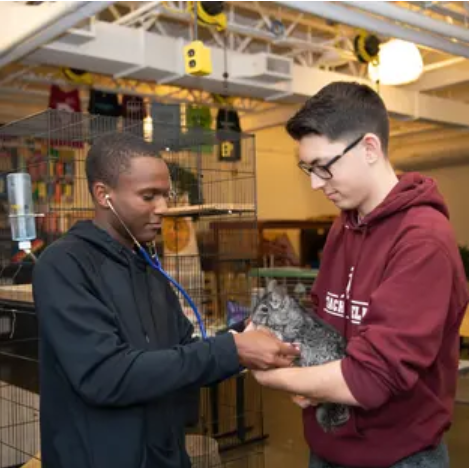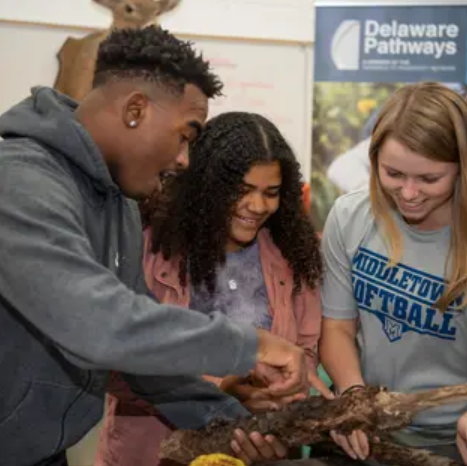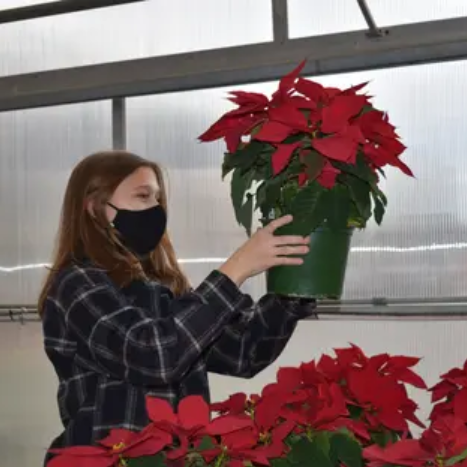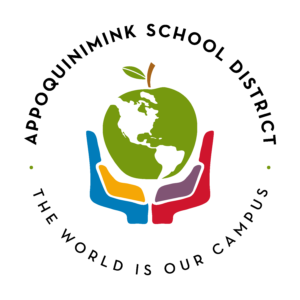
The Animal Science & Management program of study is a four (4) credit Pathway that explores: animal production and management, physical restraint and handling, conducting health exams, evaluation of behavior, principles of genetics and reproduction, animal selection through evaluation, anatomy and physiology, animal nutrition, basic veterinary practices, global food systems, ethics of food animal production, and current agricultural issues in order to foster an understanding of the steps involved in producing and marketing products for consumers. Students practice decision-making and research skills through classroom instruction, laboratory activities, and practical experiences. The program prepares students for a variety of careers in: agribusiness, agriscience education, animal genetics, animal nutrition, animal reproduction, extension educator, marine biology, wildlife biology, veterinary medicine, zoology, animal researcher, animal processor, production manager, artificial insemination technician, animal breeder, veterinary assistant/technician, wildlife manager, zoo animal specialist, animal rescue/animal control officer, and agriculture producer.
Course AG9119
1 Credit
This course focuses on the fundamentals of animal science which include animal origin, domestication and uses, careers in the animal industry, animal safety and sanitation, ways animals help humans, taxonomy and breeds, basic nutrition and health, biosecurity principles and environmental conditions on animals and animal rights vs. welfare. Students are introduced to the foundational leadership skills, responsibility, and cooperation needed to be a successful and productive citizen through a school-based agricultural education three-component model which includes FFA activities, Supervised Agricultural Experience programs, and career and leadership development events.
AG9127
1 Credit + 3 College Credits
This course enables students to demonstrate their mastery of the content covered in FSA and GDDA and apply their technical knowledge and skills in the field of animal agriculture. Students apply their mastery of biosecurity principles and environmental conditions on animals, global applications of animal agriculture, reproduction and genetics, animal nutrition, animal health care and evaluation, selection and marketing, and legal responsibilities through hands-on activities. Students apply skills gained through Supervised Agricultural Experience programs, FFA leadership activities, and career and leadership development events to better serve the community through a school based three-component agricultural education model.
*Prerequisite: Growth and Development of Domestic Animals
AG9114
1 Credit
This course is for students interested in continuing their study of animals and related animal health careers or research. Students will be going out in the field working with livestock or small animals in a production and/or veterinary setting topics such as animal health and evaluation, bandaging, giving medicines under the direction of a DVM, office procedures, medical records, nutrition, animal care, medical terminology, instrument care & identification, animal handling techniques, vital signs, lab procedures, anatomy, and pharmacology. This is the capstone senior year course for students enrolled in the Animal Science Pathway.
*Prerequisite: Domestic Animal Management

The Natural Resource Management program of study is a Pathway designed to provide students with exposure to topics in conservation management and maintenance of natural resources. Students learn responsible stewardship practices of air, soil, water, land, fish, and wildlife resources for economic, recreation, and health purposes. Students utilize a variety of classroom and laboratory activities supplemented through supervised agricultural experiences and leadership programs and activities. Students participating in this program will be prepared to enter into career fields that focus on one or more of the following areas: Natural Science, Microbiology, Water Resource Management, Wastewater Engineering, Environmental Protection, Soil & Plant Science, Environmental Engineering, Geoscience, and Precision Agriculture.
AG9124
1 Credit
This course introduces the interactions of living and nonliving systems on earth. Topics include the nature of science, ecology, water quality, chemical interactions, weather and climate, energy, and resource management as well as exploration of career opportunities on a local, state and national level. Laboratory exercises reinforce curriculum and provide students the opportunity to apply data analysis to their observations. Students are introduced to the foundational leadership skills, responsibility, and cooperation needed to be a successful and productive citizen through a school-based agricultural education three-component model which includes FFA activities, Supervised Agricultural Experience programs, and career and leadership development events.
AG9125
1 Credit
This course provides students with the opportunity to apply conservation principles to preserve the environment, natural resources, and ecosystems. Students learn proper soils and land-use practices, the impact of chemicals in the environment, and how to test water and air quality. Students understand societal issues relating to the environment as well as land use and waste management. Classroom and laboratory activities are supplemented through supervised agricultural experiences and leadership programs. Students develop leadership skills, increase levels of responsibility, and engage in cooperative activities through FFA activities, Supervised Agricultural Experience programs, and career and leadership development events through a school-based three-component agricultural education model.
*Prerequisite: Introduction to Natural Resources
AG9126
1 Credit + 3 College Credits
This course immerses students in the concepts of sustainability-related to agriculture production, land ownership and civic green space. Students investigate earth systems and resources, the living world, population dynamics, land and water use, energy resources and consumption, pollution, and global changes through discussion and debate. Students learn how to implement production and marketing practices that are profitable and environmentally sound while meeting the needs of both the present and future generations. Students practice ownership and community involvement. Students completing a program of study in this Pathway will demonstrate competence in the application of principles and techniques for the development, application, and management of environmental service systems as well as business enterprises. Students apply skills gained through Supervised Agricultural Experience programs, FFA leadership activities, and career and leadership development events to better serve the community through a school-based three-component agricultural education model.
*Prerequisite: Environmental & Natural Resource Stewardship
AG9140
1 Credit
Designed to acquaint students through work-based learning experiences with research and management activities not available on campus. Students will work with professionals in an area of concentration. Student evaluation will be based upon the recommendation of the field supervisor and detailed written reports submitted by the student. This is the capstone senior year course for students enrolled in the Natural Resources and Environmental Sciences Pathway.

AG9121
1 Credit
This course explores the plant industries and food systems of the United States in order to foster an understanding of the steps involved in growing crops for food, as well as plants for ornamental and aesthetic purposes. Students study the major characteristics of plant life, plant structures and functions, nutrient needs of plants, fundamentals of soil science, water management, cultural practices, pest management, and explore career options in the horticulture industry through classroom and laboratory instruction. Students are introduced to the foundational leadership skills, responsibility, and cooperation needed to be a successful and productive citizen through a school-based agricultural education three-component model which includes FFA activities, Supervised Agricultural Experience programs, and career and leadership development events.
AG9122
1 Credit
This course enables students to build on the knowledge and experiences gained fundamentals of plant and soil science. Students apply knowledge and concepts of plant science, soil science, water management, pest management, and various crop production characteristics through hands-on laboratory and experiential learning. PSS uses a combination of classroom and laboratory instruction that includes land labs, greenhouses, landscape beds, floral production, and hydroponics. Students develop leadership skills, increase levels of responsibility, and engage in cooperative activities through FFA activities, Supervised Agricultural Experience programs, and career and leadership development events through a school-based three-component agricultural education model.
*Prerequisite: Foundations of Plant Science
AG9123
1 Credit + 3 College Credits
This course enables students to apply principles of horticulture production and facility maintenance and design. Students learn soil conservation and land management practices, as well as concepts related to integrated pest management and how to properly use and apply pesticides, as well as principles of business management and record keeping. Students explore global economic systems, sustainability of plant life, and the multifaceted role plants play in sustaining and improving the quality of life. Students apply skills gained through Supervised Agricultural Experience programs, FFA leadership activities, and career and leadership development events to better serve the community through a school-based three-component agricultural education model.
*Prerequisite: Plant Systems Management
AG9131
1 Credit
This course applies research-based study that utilizes skills gained in the three previous levels of instruction. Students complete a comprehensive, course-long research project to further their knowledge and experience within plant science or the horticultural industry. They are expected to explore various careers within the horticultural industry and complete a minimal amount of hours of work-based experience (volunteer or paid). Students will be expected to compete in a career development event through the National FFA organization at the state level in a topic related to their completed agriscience Pathway. This is the capstone senior year course for students enrolled in the Plant and Horticultural Sciences Pathway. *Prerequisite: Plants Systems Management & Sustainability

Appoquinimink School District
118 S. Sixth Street
Odessa · DE · 19730
WBL@appo.k12.de.us
apposchooldistrict.com